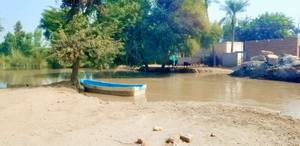
Some fifteen kilometers north-west of tehsil Jatoi of Muzaffargarh District, Basti Arain is a remote village located in the Punjab province of Pakistan. The climate remains dry and arid throughout the year with weather conditions ranging from very hot summers to mild winters. Due to its close proximity to the Indus River, the village remains highly vulnerable to floods and erratic weather patterns throughout the year.
The village community has for long suffered from poverty and deprivation. The incidence of poverty was further exacerbated by the 2010 floods which swept away most of the crops, leaving local communities deprived of their only source of income.
Ruqaiya bibi, a local from Basti Arain after getting married at a young age had to discontinue her education. A mother of two young boys, Ruqaiya herself also decided to restart her education after she started sending her children to school, and is currently enrolled in the ninth-grade. Ruqaiya’s two young sons study in primary grade at the local village school while her husband works as a tailor and barely makes enough income to make ends meet for his family. With no savings of their own, Ruqaiya and her family are forced to raise the animals of livestock owners from the neighbouring village.
“The temperatures hit extreme highs in June-July. In our village women and men work together to raise livestock and in the fields to harvest wheat crop,” says Ruqaiya.
Ruqaiya bibi has been an active member of the women farmer field school since February 2019. She has now established her own kitchen garden and regularly contributes to the group discussions by suggesting new variations of vegetables which she plants in her own garden.
“The women farmer field school sessions have helped me gain confidence. I have my own kitchen garden where I try out new varieties of seeds – we sometimes get very interesting results from planting these vegetables. I can happily say now that I also contribute to my family’s income,” says Ruqaiya gleefully.
Each day a group of 20-25 local women farmers in Basti Arain come together and are trained in skills on new farming techniques. Deeba Shaheen, the farmer field school facilitator, encourages local women farmers to investigate new approaches and stimulate discussions which eventually help them gain confidence and adopt new farming practices. By establishing their own kitchen gardens, they can contribute to food security, nutrition and economic security for their households.
“In the past, local women in Basti Arain were not familiar with the new farming practices. Now that they are aware of the economic benefits of growing their own vegetables they are motivated to establish their own homestead gardens. These women are now able to prepare organic fertilizers, organic pesticides, and have also been trained in seed production and vegetable preserving methods at the household level. The women participants of Khusha Hal women farmer field school and Sarsabz livestock women farmer field school cook vegetables from their own gardens which helps improve health and well-being of their families without any additional financial burden,” said Deeba Shaheen, women farmer field school facilitator.
Several homestead gardens have been established, increasing livelihood opportunities for over 60 households in Basti Arain.
Ruqaiya and her family are amongst thousands of women farmers who are benefitting from hands-on group learning activities for enhanced skills and improved decision making. Through the farmer field schools process, individuals and communities are being empowered with new skills and techniques.
With support from Department for International Development – Government of United Kingdom, the Food and Agriculture Organization (FAO) of the United Nations is working to build resilience in communities and households in Pakistan to manage the impact of disasters by maintaining or transforming living standards in the face of shocks and stresses.






